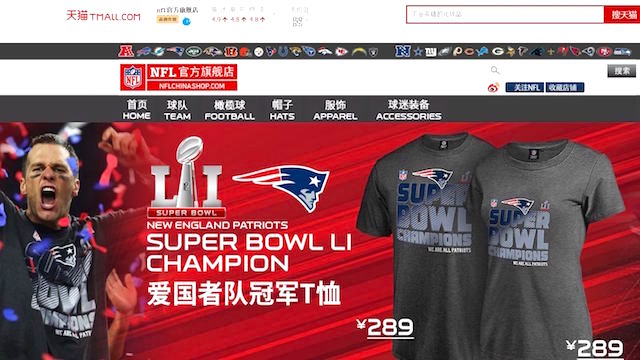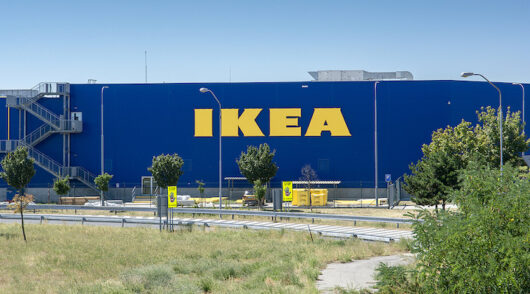While New England Patriots quarterback Tom Brady was performing his on-field heroics in Super Bowl LI, America’s National Football League (NFL) continued to score its own touchdowns in China with licensed merchandise sales.
It’s all largely due to a strategy of offering merchandise from NFL on Alibaba.
Even before the 39-year-old quarterback and his team came back from a 25-point deficit to beat the Atlanta Falcons, they were fan favourites in the 1.3 million-strong China market, reports Alizila.
What is intriguing about the NFL’s success selling footballs, jerseys and other branded gear in the world’s most-populous country is that it is doing so without the benefit of a professional league or team there — or even a marketable homegrown star, like the NBA had with Hall of Famer Yao Ming.
The NFL, which set up shop in China in 2007, says its merchandising success rests on having built a community around its main product: professional football. But the US league has also shown itself to be savvy and disciplined in cultivating its reputation, brand and following for the game in a market about 12,875 km away from its New York headquarters.
Sales of licensed merchandise started in 2013, with the launch of a store by the NFL on Alibaba’s Tmall platform. The league has recorded solid sales over the past several years, including strong performances during Alibaba’s 11.11 latest two shopping extravaganzas. The past two football seasons, culminating with Super Bowl LI, which streamed in China on Sina Weibo for the first time, have been good for the NFL.
“Bigger and broader”
“We came off an incredibly strong year in 2015, and the buzz around this past season and Super Bowl LI was bigger and broader than ever,” says China NFL MD Richard Young. “We’ve seen strong growth in viewership, fan base and merchandise sales, as well as local participation in both tackle and flag football.”
Young says the NFL fan base has grown roughly 1000 per cent in the past five years to about 19 million people. Flag football leagues have sprung up around China, and full-contact club teams are rising. Over the past five years, using data and feedback, the NFL has spent a lot of time trying to understand how Chinese consumers view its brand and how and why mainland fans interact with it.
“According to our research, fans follow the NFL as a sport because it embodies bravery, passion and leadership, as well as positivity, intelligence, teamwork and, of course, toughness,” says Young.“When you look at how you express yourself as a fan, you watch the games, you talk about them.”
The next, natural step is to buy some gear from your favourite team “to demonstrate your avidity or your loyalty to your team to everyone you meet,” Young says.
The NFL did not focus on mass appeal as it began brand-building in China. Instead, it has encouraged a small group of people to coalesce around the sport, the league and its teams to convey status and give the brand a premium feel. Viewership of games and highlights in China, partly possible through a deal Alisports signed with the NFL, is around 1.5 million a week.
“The NFL has a very tight-knit, but growing, community of fans in China. Saying you are an NFL fan can, in many ways, define you as a cultural explorer, as somebody who seeks out the very best in sports, in entertainment, and probably someone who seeks out the very best in all things in life,” says Young. “So, it can define you, just like your watch, your clothes, your car, what you drink. I think people are starting to see this, and that’s where a lot of our growth in merchandise sales comes from.”
“Know your brand”
The NFL’s advice to other businesses looking to succeed in China? Become keen listeners and discerning researchers, understanding what consumers want and how to best present them with the benefits of each product and the company behind the product.
“Know your brand and how to tell your brand story,” says Young. “Don’t confuse your popularity or success in your home market with automatic success or connection with China’s consumers.”
And while the NFL has no obvious football-brand competitors in China, that does not mean there is no competition. On the contrary, “there is a lot of competition for entertainment in China, whether it is from movies, dramas, reality shows or other sports – to keep your fans you have to be able to provide your consumers what they want, when they want it and how they want it,” says Young.
He counsels newbies to “work hand-in-hand with Tmall and your local partners to take advantage of the great reach, resourcing and consumer connection that Tmall provides to the hundreds of millions of consumers on their platform”.
He also urges them to participate in campaigns, events and special sales and promotions, and “be prepared to move and react much faster than e-commerce platforms in the West.”
Ambition is also a good thing. The NFL aims to be a top-five sport among Chinese millennials by 2020.
“Our demographic is higher-educated, has correspondingly higher income, are busy, active people, and will be growing into social-opinion leaders in the next few years,” says Young.
* Adam Najberg writes for Alizila is the Alibaba-funded but independent news service on Alibaba Group activities.






